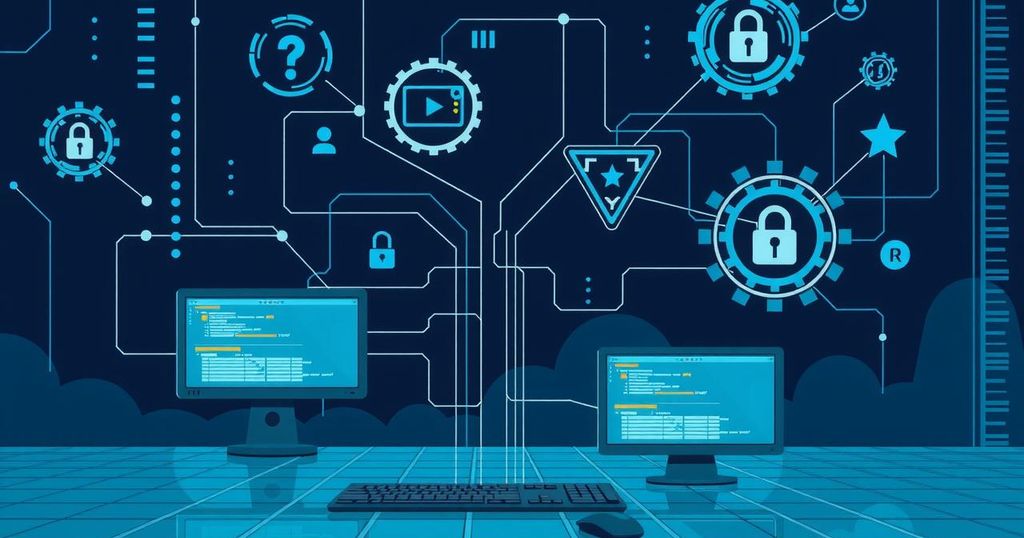South Africa’s Digital Future Compromised by Escalating Cyber Threats
South Africa, a leading African economy, faces significant cyber threats, as highlighted by rising ransomware incidents and the increasing impact of cybercrime. Experts emphasize the need for stricter enforcement of existing cyber laws and improved collaboration among government, businesses, and individuals. Despite these challenges, there is potential for South Africa to establish itself as a prominent digital economy by enhancing its cybersecurity measures and infrastructure.
South Africa is recognized as one of Africa’s largest and most diversified economies. With its G20 presidency coming in 2025, there are high expectations for the nation to address its economic challenges and emerge as a leading digital economy. However, the MANCOSA institution warns that achieving these objectives may be more complex than anticipated, primarily due to rising cyber threats.
Despite South Africa’s vital role in digital connectivity within Africa, it faces considerable risks from cybercrime. Trisha Govender, Manager of the MANCOSA School of Information and Digital Technology, expresses concerns about the nation being among the most targeted by cybercriminals. She questions whether the current legal framework is sufficiently adaptable to combat evolving cyber threats effectively.
The 2024 Interpol African Cyberthreat Assessment Report highlights ransomware and digital extortion as major threats on the continent, emphasizing their financial ramifications and capacity to disrupt critical services. Cybersecurity firm Check Point indicates a worrisome trend, revealing that one in 15 African organizations faced a ransomware attempt weekly, surpassing the global average. In South Africa alone, over 300 ransomware attempts were recorded by Kaspersky in one week, reflecting the growing threat.
The financial implications of these attacks are alarming. IBM identified the average cost of a ransomware incident at $5.13 million in 2023, marking a 13% increase from the previous year. Govender anticipates the release of the 2025 report, noting that cybercriminals are increasingly targeting Africa, marking it as an opportunistic landscape for such attacks.
Emerging statistics indicate that ransomware, business email compromise (BEC), and various online scams are rapidly rising. BEC is reported to account for 24-25% of financially motivated attacks, with non-financial employees being frequent targets. This relentless threat is echoed by the Southern African Fraud Prevention Service, pointing to technology as central to many regional fraud cases.
Although South Africa acknowledges the cyber threat landscape, progress has been inadequate since it was first emphasized by MANCOSA in 2020. Govender argues that enforcement weaknesses, skill deficits, infrastructure vulnerabilities, and insufficient threat intelligence sharing characterize the country’s current stance on cybersecurity. Specific concerns include slow prosecution rates and the lack of mandatory cybersecurity regulations for critical infrastructure.
Govender posits that increased funding towards cyber enforcement and the establishment of specialized prosecution units, akin to those in Europe, could address enforcement issues. Moreover, enforcing cybersecurity standards for critical sectors remains crucial to protecting national infrastructure.
The discourse around responsibility for cybersecurity encompasses the Government, corporate entities, and individuals alike. Govender asserts that the Government needs to enforce cyber laws while developing a comprehensive strategy for national cybersecurity. Businesses must adopt robust policies and invest in staff training, whereas individuals must remain vigilant and well-informed about online threats.
Despite the ongoing challenges presented by cyber threats, Govender sees potential for South Africa to emerge as a notable digital economy on the continent. She highlights the country’s strong technology ecosystem, burgeoning AI, and fintech sectors. However, a call for substantial investment in cybersecurity education and legislation mandating compliance for critical infrastructure is essential for sustainable growth. Collaborative efforts between the Government and businesses, along with an awareness of geopolitical challenges, will ultimately enable South Africa to attract long-term investments.
In conclusion, South Africa’s ambition to position itself as a leading digital economy is significantly undermined by rising cyber threats. While there are evident strengths within its technological ecosystem, weaknesses in cybersecurity enforcement and infrastructure present considerable risks. Addressing these challenges requires concerted efforts from government entities, corporations, and individual citizens to develop and implement robust cybersecurity measures, thereby enabling South Africa to thrive in the digital landscape.
Original Source: www.zawya.com




Post Comment